- Home
- Anne McCaffrey
Brain Ships Page 11
Brain Ships Read online
Page 11
"And What's on second," she replied absentmindedly. Just before leaving she'd gotten a datahedron on old-Terran slang phrases and their derivation; toying with the idea of producing that popular-science article. If it got published on enough nets, it might well earn her a tidy little bit of credit—and no amount of credit, however small, was to be scorned. But one unexpected side-effect of scanning it was that she tended to respond with the punch lines of jokes so old they were mummified.
Though now, at least, she knew what the CenCom operator had meant by "hang onto your bustle" and that business about the wicked witch who'd had a house dropped on her sister.
"What?" Alex responded, perplexed. "No, never mind. I don't want to know. Just tell me whose orders we're supposed to be following. I got lost back there in the fifth or sixth dispatch."
"I've got it all straight now, and it's dual-duty," she replied. "Institute, with backup from Central, although they were countermanding each other in the first four or five sets of instructions. One of the Excavation digs hasn't been checking in. Went from their regular schedule to nothing, not even a chirp."
"You don't sound worried," Alex pointed out.
"Well, I am, and I'm not," she replied, already calculating the quickest route through hyperspace, and mentally cursing the fact that they didn't have Singularity Drive. But then again, there wasn't a Singularity point anywhere near where they wanted to go. So the drive wasn't the miracle of instantaneous transportation some people claimed it was. Hmm, and some brainships too, naming no names. All very well if there were Singularity points littering the stellarscape like stars in the Core, but out here, at this end of the galactic arm, stars were close, but points were few and far between. One reason why the Institute hadn't opted for a more expensive ship. "If it were an Exploratory dig like my—like we've been trotting supplies and mail to, I would worry a lot. They're horribly vulnerable. And an Evaluation dig is just as subject to disaster, since the maximum they can have is twenty people. But a Class Three—Alex, this one had a complement of two hundred! That's more that enough people to hold off any trouble!"
"Class Three Excavation sites get a lot of graduate students, don't they?" Alex said, while she locked things down in her holds for takeoff with help from the servos. Pity the cargo handlers hadn't had time to stow things properly.
"Exactly. They provide most of the coolie labor when there aren't any natives to provide a work force—that's why the Class Three digs have essentially the same setup as a military base. Most of the personnel are young, strong, and they get the best of the equipment. This one has—" she quickly checked her briefing "—one hundred seventy-eight people between the ages of twenty-five and thirty-five. That's plenty to set up perimeter guards."
Alex's fingers raced across the keypads in front of him, calling up data to her screens. "Hmm. No really nasty native beasties. Area declared safe. And—my. Fully armed, are we?" He glanced over at the column. "I had no idea archeologists were such dangerous beings! They never told me that back in secondary school!"
"Grrr," she responded. She flashed a close-up of the bared fangs of a dog on one of the screens he wasn't using. In the past several weeks she and Alex had spent a lot of time talking, getting to know each other. By virtue of her seven years spent mobile, she was a great deal more like a softperson than any of her classmates, and Alex was fun to be around. Neither of them particularly minded the standard issue beiges of her interior; what he had done, during the time spent in FTL, was to copy the minimalist style of his sensei's home, taking a large brush and some pure black and red enamel, and copying one or two Zen ideographs on the walls that seemed barest. She thought they looked very handsome—and quietly elegant.
Of course, his cabin was a mess—but she didn't have to look in there, and she avoided doing so as much as possible.
In turn, he expressed delight over her "sparkling personality." No matter what the counselors said, she had long ago decided that she had feelings and emotions and had no guilt over showing them to those she trusted. Alex had risen in estimation from "partner" to "trusted" in the past few weeks; he had a lively sense of humor and enjoyed teasing her. She enjoyed teasing right back.
"Pull in your fangs, wench," he said. "I realize that the only reason they get those arms is because there are no sentients down there. So, what's on the list of Things That Get Well-Armed Archeologists? I have the sinking feeling there were a lot of things they didn't tell me about archeology back in secondary school!"
"Seriously? It's a short list, but a nasty one." She sobered. "Lock yourself in; I'm going to lift, and fast. Things are likely to rattle around." With drives engaged, she pulled away from her launch cradle, acknowledged Traffic Control and continued her conversation, all at once. "Artifact thieves are high on that list—if you've got a big dig, you can bet that there are things being found that are going to be worth a lot to collectors. They'll come in, blast the base, land, kill everyone left over that gets in their way, grab the loot and lift, all within hours." Which was why the hidey was so far from our dome, and why Mum and Dad told me to get in it and stay in it if trouble came. "But normally they work an area, and normally they don't show up anyplace where Central has a lot of patrols. There haven't been any thieves in that area, and it is heavily patrolled."
"So—what's next on the list?" Alex asked, one screen dedicated to the stats on the dig, his own hands busy with post-lift chores that some brawns would have left to their brains. Double-checking to make sure all the servos had put themselves away, for instance. Keeping an eye on the weight-and-balance in the holds. Just another example, she thought happily, of what a good partner he was.
She was clear of the cradle and about to clear local airspace. Nearing time to accelerate "like a scalded cat." Now that's a phrase that's still useful. . . . "Next on the list is something we don't even have to consider, and that's a native uprising."
"Hmm, so I see." His eyes went from the secondary screen where the data on the dig was posted and back to the primary. "No living native sophonts on the continent. But I can see how it could be the Zulu wars all over again."
He nodded, acknowledging her logic, and she was grateful to his self-education in history.
"Precisely," she replied. "Throw enough warm bodies at the barricades, and any defense will go down. In a native uprising, there are generally hordes of fervent fanatics willing to die in the cause and go straight to Paradise. Accelerating, Alex."
He gave her a thumbs-up, and she threw him into his seat. He merely raised an eyebrow at her column and kept typing. "There must be several different variations on that theme. Let's see—you could have your Desecration of Holy Site Uprising, your Theft of Ancient Treasures Uprising, your Palace Coup Uprising, your Local Peasant Revolution Uprising. Uh-huh. I can see it. And when you've overrun the base, it's time to line everyone up as examples of alien exploitation. Five executioners, no waiting."
"They normally don't kill except by accident, actually, or in the heat of the moment," she told him. "Most native sophonts are bright enough to realize that two hundred of Central Systems' citizens, a whole herd of their finest minds and their dependents, make a much better bargaining chip as hostages than they do as casualties."
"Not much comfort to those killed in the heat of the moment," he countered. "So, what's the next culprit on the list?"
"The third, last, and most common," she said, a bit grimly, and making no effort to control her voice-output. "Disease."
"Whoa, wait a minute—I thought that these sites were declared free of hazard!" He stopped typing and paled a little, as well he might. Plague was the bane of the Courier Service existence. More than half the time of every CS ship was spent in ferrying vaccines across known space—and for every disease that was eradicated, three more sprang up out of nowhere. Nor were the brawns immune to the local plagues that just might choose to start at the moment they planeted. "I thought all these sites were sprayed down to a fare-thee-well before they let anyone move in!"
/>
"Yes, but that's the one I'm seriously concerned about." And not just because it was a bug that got me. "That, my dear Alex, is what they don't tell you bright-eyed young students when you consider a career in archeology. The number one killer of xeno-archeologists is disease." And the number one crippler, for that matter. "Viruses and proto-viruses are sneaky sons-of-singularities; they can hibernate in tombs for centuries, millennia, even in airless conditions." She flashed up some Institute statistics; the kind they didn't show the general public. There was a thirty percent chance that a xeno-archeologist would be permanently disabled by disease during his career; a twenty percent chance that he would die. And a one hundred percent chance that he would be seriously ill, requiring hospitalization, from something caught on a dig, at some point in his life.
"So the bug hibernates. Then when the intrepid explorer pops the top off—" Alex looked as grim as she felt.
"Right. Gotcha." She laughed, but it had a very flat sound. "Well, sometimes it's been known to be fortuitous. The Cades actually met when they were recovering from Henderson's Chorea—ah—or so their biographies in Who's Who say. There could be worse things than having the Institute cover your tropic vacation."
"But mostly it isn't." His voice was as flat as her laugh had been.
"Ye-es. One of my—close friends is Doctor Kennet on the Pride of Albion. He's gotten to be a specialist in diseases that get archeologists. He's seen a lot of nasty variations over the years—including some really odd opportunistic bugs that are not only short-lived after exposure to air, but require a developing nervous system in order to set up housekeeping."
"Developing—oh, I got it. A kid, or a fetus, provided it could cross the placental barrier." He shivered, and his expression was very troubled. "Brr, that's a really nasty one."
"Verily, White Knight." She decided not to elaborate on it. Maybe later. To let him know I'm not only out for fortune and glory. "I just wanted you to be prepared when we got there, which we will in—four days, sixteen hours, and thirty-five minutes. Not bad, for an old-fashioned FTL drive, I'd say." She'd eliminated the precise measurements that some of the other shellpersons used with their brawns in the first week—except when she was speaking to another shellperson, of course. Alex didn't need that kind of precision, most of the time; when he did, he asked her for it. She had worried at first that she might be getting sloppy—
No, I'm just accommodating myself to his world. I don't mind. And when he needs precision, he lets me know in advance.
"Well, let me see if I can think of some non-lethal reasons for the dig losing communications—" He grinned. "How about—'the dinosaur ate my transmitter?'"
"Cute." Now that their acceleration had smoothed and they were out of the atmosphere, she sent servos snooping into his cabin, as was her habit whenever a week or so went by, and he was at his station, giving her non-invasive access. "Alex, don't you ever pick up your clothes?"
"Sometimes. Not when I'm sent hauling my behind up the stairs with my tail on fire and a directive from CS ordering me to report back to my ship immediately." He shrugged, completely unrepentant. "I wouldn't even have changed my clothes if that officious b—"
"Alex," she warned. "I'm recording, I have to. Regulations." Ever since the debacle involving the Nyota Five, all central cabin functions were recorded, whenever there was a softperson, even if only a brawn, present. That was regulation even on AI drones. The regs had been written for AI drones, in fact; and CS administration had decided that there was no reason to rewrite them for brainships—and every reason why they shouldn't. This way no one could claim "discrimination," or worse, "entrapment."
"If that officious bully hadn't insisted I change to uniform before lifting." He shook his head. "As if wearing a uniform was going to make any difference in how well you handled the lift. Which was, as always, excellent."
"Thank you." She debated chiding him on his untidy nature and decided against it. It hadn't made any difference before, it probably wouldn't now. She just had the servos pick up the tunic and trousers—wincing at the ultra-neon purple that was currently in vogue—and deposited them in the laundry receptacle.
And I'll probably have to put them away when they're clean, too. No wonder they wanted him to change. Hmm. Wonder if I dare "lose" them? Or have a dreadful accident that dyes them a nice sober plum?
That was a thought to tuck away for later. "Getting back to the dinosaur—com equipment breaks, and even a Class Three dig can end up with old equipment. If the only fellow on the dig qualified to fix it happens to be laid up with broken bones—in case you hadn't noticed, archeologists fall down shafts and off cliffs a lot—or double-pneumonia . . ."
"Good point." He finished his "housekeeping chores" with a flourish and settled back in his chair. "Say, Tia, they're all professorial types—do they ever just get so excited they forget to transmit?"
"Brace yourself for FTL—" The transition to FTL was nowhere near as distressing to softpersons as the dive into a Singularity, but it required some warning. Alex gripped the arms of the seat, and closed his eyes, as she made the jump into hyperspace.
She never experienced more than a brief shiver—like ducking into a freezing-cold shower—but Alex always looked a little green during transition. Fortunately, he had no trouble in hyper itself.
And if I can ever afford a Singularity Drive, his records say he takes those transitions pretty well. . . .
Well, right now, that was little more than a dream. She picked up the conversation where it had left off. "That has happened on Class One digs and even Class Two, but usually somebody realizes the report hasn't been made after a while when you're dealing with a big dig. Besides, logging reports constitutes publication, and grad students need all the publication they can get. Still, if they just uncovered the equivalent of Tutankhamen's tomb, they might all be so excited—and busy documenting finds and putting them into safe storage—that they've forgotten the rest of the universe exists."
He swallowed hard, controlling his nausea. It generally seemed to take his stomach a couple of minutes to settle down. Maybe the reason it doesn't hit me is because there's no sensory nerves to my stomach anymore. . . .
But that only brought back unpleasant memories; she ruthlessly shunted the thought aside.
"So—" he said finally, as his color began to return. "Tell me why you aren't in a panic because they haven't answered."
"Artifact thieves would probably have been spotted, there aren't any natives to revolt, and disease usually takes long enough to set in that somebody would have called for help," she said. "And that's why CS wasn't particularly worried, and why they kept countermanding the Institute's orders. But either this expedition has been out of touch for so long that even they think there's something wrong, or they've got some information they didn't give us. So we're going in."
"And we find out when we get there," Alex finished; and there wasn't a trace of a smile anywhere on his face.
* * *
Tia brought them out of hyper with a deft touch that rattled Alex's insides as little as possible. Once in orbit, she sent down a signal that should activate the team's transmitter if there was anything there to activate. As she had told Alex several days ago, com systems broke. She was fully expecting to get no echo back.
Instead—
You are linked to Excavation Team Que-Zee-Five-Five-Seven. The beacon's automatic response came instantly, in electronic mode. Then came the open carrier wave.
"Alex, I think we have a problem," she said, carefully.
"Echo?" He tensed.
"Full echo—" She sent the recognition signal that would turn on landing assistance beacons and alert the AI that there was someone Upstairs—the AI was supposed to open the voice-channel in the absence of humans capable of handling the com. The AI came online immediately, transmitting a ready to receive instructions signal.
"Worse, they've got full com. I just got the AI go-signal."
She blipped a compressed several
megabytes of instructions to give her control of all external and internal recording devices, override any programs installed since the base was established, and give her control of all sensory devices still working.
"Get the AI to give me some pictures," he said, all business. "If it can."
"Coming up—ah, external cam three—this is right outside the mess hall and—oh shellcrack—"
"I'll second that," Alex replied, just as grimly.
The camera showed them—somewhat fuzzily—a scene that was anything but a pretty sight.
There were bodies lying in plain view of the camera; from the lack of movement they could not be live bodies. They seemed to be lying where they fell, and there was no sign of violence on them. Tia switched to the next camera the AI offered; a view inside the mess hall. Here, if anything, things were worse. Equipment and furniture lay toppled. More bodies were strewn about the room.
A chill that had nothing to do with the temperature in her shell held her in thrall. Fear, horror, helplessness—
Her own private nightmares—
Tia exerted control over her internal chemistry with an effort; told herself that this could not be the disease that had struck her. These people were taken down right where they stood or sat—
She started to switch to another view, when Alex leaned forward suddenly.
"Tia, wait a minute."
Obediently, she held the screen, sharpening the focus as well as the equipment, the four-second lag-to-orbit, and atmospheric interference would allow. She couldn't look at it herself.
"There's no food," he said, finally. "Look—there's plates and things all over the place, but there's not a scrap of food anywhere."
"Scavengers?" she suggested. "Or whatever—"
Whatever killed them? But there are no signs of an invasion, an attack from outside—
He shook his head. "I don't know. Let's try another camera."

 The Renegades of Pern (dragon riders of pern)
The Renegades of Pern (dragon riders of pern) Dragonquest
Dragonquest Moreta (Dragonlady of Pern)
Moreta (Dragonlady of Pern)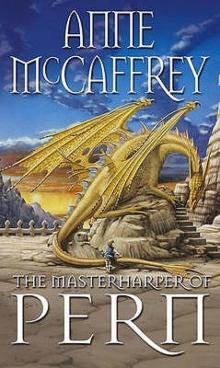 The Masterharper of Pern
The Masterharper of Pern If Wishes Were Horses
If Wishes Were Horses Dragonflight
Dragonflight No One Noticed the Cat
No One Noticed the Cat The White Dragon
The White Dragon A Gift of Dragons
A Gift of Dragons Harper Hall - Dragonsong
Harper Hall - Dragonsong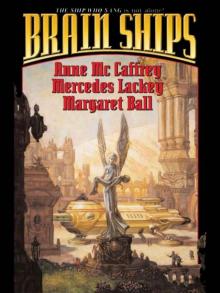 Brain Ships
Brain Ships All The Weyrs of Pern
All The Weyrs of Pern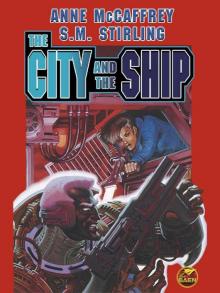 The City and the Ship
The City and the Ship The Chronicles of Pern: First Fall
The Chronicles of Pern: First Fall Acorna’s Search
Acorna’s Search Powers That Be
Powers That Be Second Wave
Second Wave Chronicles of Pern (First Fall)
Chronicles of Pern (First Fall) The Kilternan Legacy
The Kilternan Legacy Decision at Doona
Decision at Doona Dragondrums (dragon riders of pern)
Dragondrums (dragon riders of pern) Dragonsinger (dragon riders of pern)
Dragonsinger (dragon riders of pern) The Master Harper of Pern
The Master Harper of Pern Crystal Singer
Crystal Singer Acorna’s People
Acorna’s People Pegasus in Flight
Pegasus in Flight Sky Dragons Dragonriders of Pern
Sky Dragons Dragonriders of Pern Dragonriders of Pern 4 - Dragonsinger
Dragonriders of Pern 4 - Dragonsinger Treaty at Doona
Treaty at Doona Damia's Children
Damia's Children Stitch In Snow
Stitch In Snow The Rowan
The Rowan Dinosaur Planet
Dinosaur Planet The Year of the Lucy
The Year of the Lucy The White Dragon p-4
The White Dragon p-4 Power Lines
Power Lines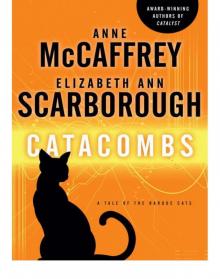 Catacombs
Catacombs Moreta
Moreta Dragonsinger
Dragonsinger Crystal Line
Crystal Line The Renegades of Pern
The Renegades of Pern Moreta - Dragonlady of Pern p-8
Moreta - Dragonlady of Pern p-8 Deluge
Deluge The Skies of Pern
The Skies of Pern Acorna's Quest
Acorna's Quest Dragon's Kin
Dragon's Kin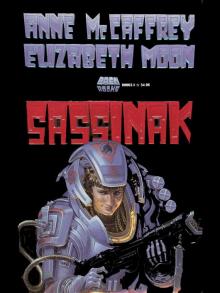 Sassinak
Sassinak![Crystal Universe - [Crystal Singer 03] - Crystal Line Read online](http://i1.bookreadfree.com/i1/03/31/crystal_universe_-_crystal_singer_03_-_crystal_line_preview.jpg) Crystal Universe - [Crystal Singer 03] - Crystal Line
Crystal Universe - [Crystal Singer 03] - Crystal Line Freedom's Landing
Freedom's Landing Acorna’s Quest
Acorna’s Quest Masterharper of Pern
Masterharper of Pern Restoree
Restoree Dolphins of Pern
Dolphins of Pern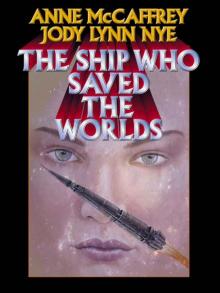 The Ship Who Saved the Worlds
The Ship Who Saved the Worlds Acorna's Triumph
Acorna's Triumph Acorna's Rebels
Acorna's Rebels![[Acorna 08] - First Warning: Acorna's Children (with Elizabeth Ann Scarborough) Read online](http://i1.bookreadfree.com/i1/04/06/acorna_08_-_first_warning_acornas_children_with_elizabeth_ann_scarborough_preview.jpg) [Acorna 08] - First Warning: Acorna's Children (with Elizabeth Ann Scarborough)
[Acorna 08] - First Warning: Acorna's Children (with Elizabeth Ann Scarborough) Dragonsong (dragon riders of pern)
Dragonsong (dragon riders of pern) Dragonriders of Pern 6 - Dragondrums
Dragonriders of Pern 6 - Dragondrums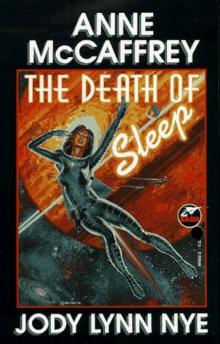 The Death of Sleep
The Death of Sleep Crisis On Doona
Crisis On Doona Nimisha's Ship
Nimisha's Ship Black Horses for the King
Black Horses for the King Changelings
Changelings Freedom's Choice
Freedom's Choice The Lady
The Lady The Coelura
The Coelura Catalyst
Catalyst The Unicorn Girl
The Unicorn Girl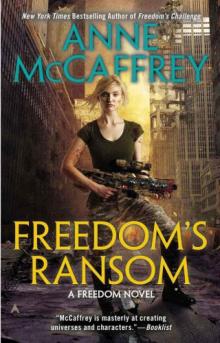 Freedom's Ransom
Freedom's Ransom Nerilka's Story
Nerilka's Story Dragon's Fire
Dragon's Fire Generation Warriors
Generation Warriors Lyon's Pride
Lyon's Pride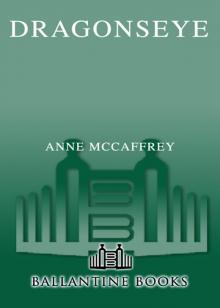 Dragonseye
Dragonseye Dragon Quest
Dragon Quest Dragondrums
Dragondrums Dragonsong
Dragonsong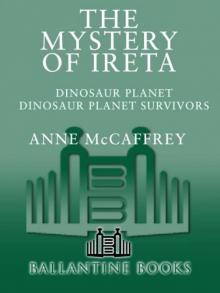 The Mystery of Ireta
The Mystery of Ireta Dolphins' Bell
Dolphins' Bell To Ride Pegasus
To Ride Pegasus Power Play
Power Play The Dragonriders of Pern
The Dragonriders of Pern An Exchange of Gifts
An Exchange of Gifts The Ship Who Sang
The Ship Who Sang Sky Dragons: Dragonriders of Pern
Sky Dragons: Dragonriders of Pern Maelstrom
Maelstrom Dragons Dawn
Dragons Dawn Dragon Song
Dragon Song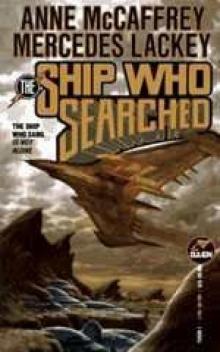 The Ship Who Searched b-3
The Ship Who Searched b-3 Damia
Damia Freedom's Challenge
Freedom's Challenge